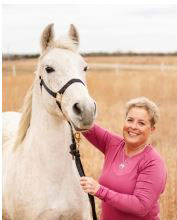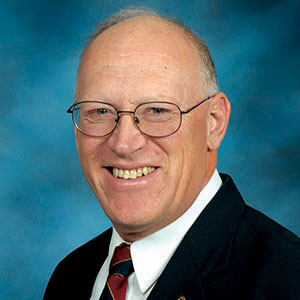Kansas Profile – Now That’s Rural: Karen Everhart, Rainbow Meadows
March 22, 2023
By Ron Wilson, director of the Huck Boyd National Institute for Rural Development at Kansas State University
 The three Rs. When I was a kid, that referred to Readin,’ `Ritin,’ and `Rithmetic.
The three Rs. When I was a kid, that referred to Readin,’ `Ritin,’ and `Rithmetic.
Today we’ll learn about a different set of Rs that are being applied to the world of horses: Rescue, Rehabilitate, and Re-home. Those are the goals of a remarkable enterprise that is helping to save and benefit horses in rural Kansas.
At right: Karen Everhart, with Vanessa | Download this photo
Karen Everhart is executive director of the non-profit organization Rainbow Meadows Equine Rescue & Retirement, which she co-founded with her husband Dave. Karen and Dave are from the Wichita area originally. Everhart said she was the proverbial “horse-crazy girl” who spent summers with horses on her family’s farm in southeast Kansas.
She met and married Dave who spent 38 years in military service. Everhart became a medical administrator but never forgot her love of horses.
In 1981, she purchased the first horse of her own: A golden Palomino mare named Rainbow. Over time, she added to her horse herd. In 2005, she retired from her health administrator position and purchased a ranch in Chautauqua County.
“People would contact me about some horse that was abandoned or in a kill pen and say, `Could you help this horse?’” Everhart said. Within four months, her horse herd doubled from 10 to 20. It was clear there was a need.
In September 2005, Rainbow Meadows Equine Rescue & Retirement was incorporated as a 501(c)3 organization. It can now receive tax-deductible donations. The organization is named Rainbow Meadows in honor of Everhart’s first beloved horse.
“Since that time, we’ve worked harder than we ever did in our professional lives,” Everhart said with a smile. “We appreciate our wonderful, caring volunteers.”
The goal is to rescue horses, mules and donkeys that are at risk. These equine are rehabilitated and, where appropriate, adopted out to caring homes.
There are two types of intake to the program. One is horses from horse-owners who find themselves unable to care for their equines due to circumstances such as illness, changed family situations, or otherwise.
“We can be a first responder for the horses,” Everhart said. The second type of intake, much less common, is receiving horses through a sheriff or police department when the horses are legally seized due to abuse or neglect of the animals.
The Everhart’s daughter earned her master’s degree at K-State, met her future husband, and eventually settled in the Manhattan area. When grandchildren were born, Karen and Dave wanted to be closer to them.
“I told the Board of Directors that we wanted to move closer to Manhattan so maybe it was time to close Rainbow Meadows,” Everhart said. “The Board said, `You’re welcome to relocate, but we want this to continue.’”
After a long search for property, Karen found and bought the place where Rainbow Meadows is today. “God opened the door to this place,” Everhart said. It is located along Highway 77, eight miles south of Junction City and north of the rural community of Woodbine, population 157 people. Now, that’s rural.
“This is a mission, this is a ministry,” Everhart said. “These (abused) horses don’t deserve the kind of treatment they’ve received.”.
Since its founding, Rainbow Meadows has assisted in rescuing hundreds of horses. In addition to having horses that are adopted, Rainbow Meadows offers a horse retirement program where owners can provide monthly support for their horses to come to Rainbow Meadows and live out their days in safety and comfort.
In support of this work, a fundraising gala is held each year. In 2023, the gala will be held at Rock Springs Ranch on the evening of April 1. For more information about the gala and Rainbow Meadows, go to www.rainbowmeadowsranch.com.
The three Rs. In this case, the three Rs refer to Rescue, Rehabilitate, and Re-home, which are the goals of Rainbow Meadows Equine Rescue & Retirement.
We commend Karen and Dave Everhart and all those involved with this remarkable organization that is making a difference in the lives of horses and horse owners.
They are doing Rescue Really Right.
Audio and text files of Kansas Profiles are available at http://www.kansasprofile.com. For more information about the Huck Boyd Institute, interested persons can visit http://www.huckboydinstitute.org.
***


